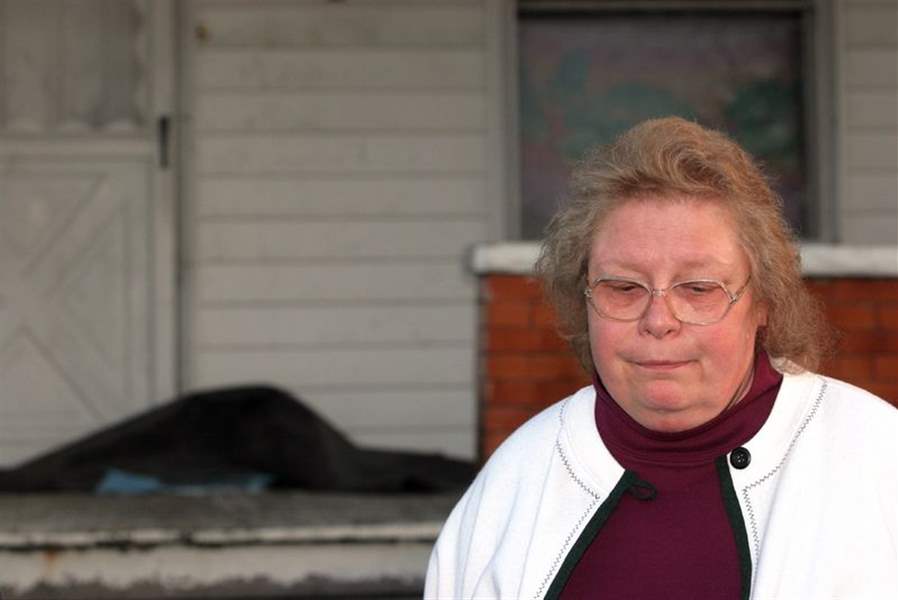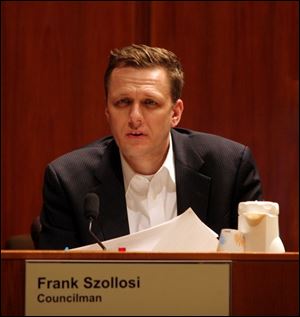
Investments in real estate irk residents of Lagrange Village
4/5/2005
Beth Lewandowski, at 262 Hudson Street, in the Lagrange area, questions the benefit to Ohio from investments with Tom Noe.
fraser / blade

Beth Lewandowski, at 262 Hudson Street, in the Lagrange area, questions the benefit to Ohio from investments with Tom Noe.
When North Toledo residents hear that the state is pleased with the profits it has earned from an investment fund controlled by Tom Noe, they sound a common refrain: At what cost?
Residents of the Lagrange neighborhood expressed anger yesterday over the news that money controlled by Ohio was invested in a controversial Toledo-area real estate business that they have tangled with for years.
"To me, that's just appalling," said Beth Lewandowski, president of Lagrange Village Council.
Mrs. Lewandowski talked as she stood in front of a home, 262 East Hudson St., owned by Westhaven Group, a limited liability partnership controlled by John Ulmer.
The home was in poor shape, debris on the front porch of the bottom unit. Its unkempt appearance stands out.
"That's the problem with these properties. They often sit right in the middle of a neighborhood," she said.

City councilman Frank Szollosi says investments of workers' compensation money - generated by insurance premiums paid by employers - should not be made with John Ulmer.
The state Bureau of Workers Compensation has invested $50 million with a rare-coin fund run by Mr. Noe, The Blade reported Sunday. The stories also revealed that Mr. Noe - a prominent local Republican and frequent contributor to GOP campaigns - took some of that money and invested it in Mr. Ulmer's real estate business.
Mr. Ulmer, an Ottawa Hills businessman, buys and sells houses in the area, often in poorer neighborhoods.
Activists have been critical of him, saying his properties are substandard and that his lending practices cause people to lose their homes.
One of those angered by the news is Frank Szollosi, an at-large Toledo city councilman. He said the state shouldn't be investing workers' compensation money - generated by insurance premiums paid by employers - with Mr. Ulmer.
"It's wrong," Mr. Szollosi said. "The grass-roots leaders here should be upset that money they pay is being used against them."
Mr. Noe has said he invested with Mr. Ulmer because he wanted to get good returns while he searched for coin deals. Mr. Ulmer was paying him 10 and 12 percent on the money he invested, which totalled nearly $1 million. The state, through Mr. Noe's companies, still has more than $350,000 invested in Mr. Ulmer's business.
Ramon Perez, a community activist for the nonprofit Lagrange Development Corp., said it's not the kind of investment the state should make.
"It's dirty money as far as we're concerned," Mr. Perez said. "It's amazing the state didn't do a better job following the money."
In a 2003 Blade article about Mr. Ulmer and his business, Mr. Noe defended him, saying he allows people with spotty credit to become homeowners. Some of Mr. Ulmer's biggest defenders say he has helped many reach the American dream.
Mr. Ulmer takes investors' money and buys homes, often in the lower-income parts of Toledo. He then fixes them and resells them, acting as a private bank that charges interest rates above traditional banks and mortgage companies.
The resulting revenue stream allows him to provide healthy returns to his investors. With some properties, like the one on East Hudson, Westhaven is the landlord.
Mr. Noe told The Blade that the properties on which his company has held mortgages - collateral on its investment - are mostly in the suburbs. His company has held mortgages for property in Springfield Township, Sylvania Township, Sylvania, and Jerusalem Township, as well as some properties in Toledo, county property records show.
An internal review of the rare-coin deal by the Bureau of Workers Compensation raised questions about the mortgages that Mr. Ulmer's companies granted Mr. Noe as collateral. Keith Elliott, the manager in charge of the review, wrote in a memo that he did not have documentation to prove the value of the properties.
Contact Mike Wilkinson at:
mwilkinson@theblade.com or
419-724-6104.